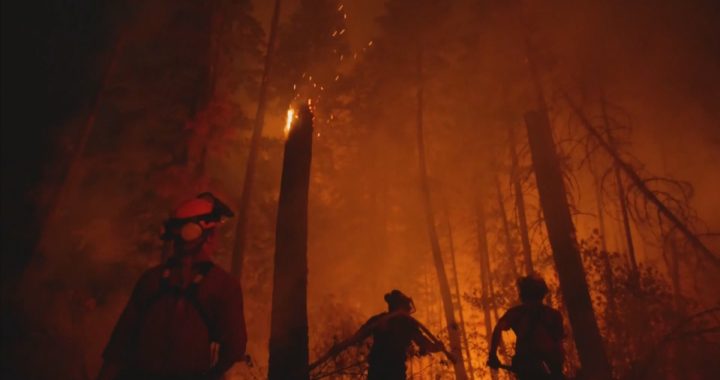Land protectors who blockaded and occupied a major hydroelectric project site under three years ago are now mourning the death of the Muskrat Falls.
Public hearings for the Muskrat Falls provincial inquiry reached ground zero this week with a stop in Happy Valley-Goose Bay, Labrador literally hours after flooding of the controversial dam’s reservoir had begun just a few kilometres upstream on the Churchill River.
Emotions ran high for some as 10 individuals were allotted 10 minutes each to speak.
“Now I come to you your land and I give you 10 minutes; I give you 10 minutes to be able to say how I feel about the land that I love more than my own life,” said Kirk Lethbridge, who was arrested in 2013 while protesting outside the project site.
The provincial inquiry is investigating the project, which is years delayed and more than double its original projected cost.
Ongoing concerns around the project include its structural safety, environmental risks, the anticipated methyl mercury contamination of fish and other traditional foods of the Innu and Inuit in the area, and the economic burden on generations of people in Newfoundland and Labrador.
Much of the blame for what is widely regarded as one of the worst economic and political decisions in the province’s history has fallen on crown energy corporation Nalcor Energy and the recent Progressive Conservative and Liberal governments.
“I’ve been…in the Newfoundland jail for protesting Muskrat Falls I’d like to see the real criminals go to jail — the ones that destroyed the land,” Lethbridge told APTN News after Thursday’s hearing.
A major peer-reviewed scientific study led by researchers at Harvard University projected three years ago that flooding the Muskrat Falls reservoir could result in significant increases of mercury exposure to Inuit who eat traditional foods, putting some at risk of health impacts from the neurotoxin.
Others expressed concerns over the North Spur, a piece of land that juts out into the Churchill River at Muskrat Falls and is being used as part of the dam.
Locals, including Innu elders with traditional knowledge of the area, have said for years the land, also referred to locally as “Spirit Mountain,” will not hold back the water in the dam’s reservoir.
Locals living in the downstream flood zone have told APTN some are sleeping with lifejackets near their beds in the event of a dam breach.
Barry Learmonth, a co-counsel with the Muskrat Falls inquiry, said he was “quite taken by the, I’d say, fear — the actual physical and mental fear that people conveyed about the concern that the something will happen with the North Spur.”
Despite public outcry and warnings from engineering experts that the dam will not be safe following reservoir flooding, Nalcor has stood by its own research on the matter.
Many continue to call for an independent inquiry into the North Spur.
Jamie Felsberg, who grew up in the area, said many have moved on from trying to stop the project.
“They just want honesty and they want to make sure that people are safe because all in all that’s really what matters here,” he said.
Felsberg said he hopes his and other locals’ testimonies before the inquiry are heard and responded to appropriately.
“There are a lot of emotions flowing and a lot of knowledge, traditional knowledge, which is extremely valuable that was shown this evening. And all in all, hopefully, I think there’s going to be a good outcome.”
Southern Inuit Elder Jim Learning has been arrested multiple times and jailed twice for resisting Muskrat Falls.
In 2013 he launched a six-day hunger strike while in custody.
He said local Indigenous groups were not properly consulted before the project began.
“If we had been consulted at this level early on that would have been more fair, but we weren’t. Traditional knowledge was blown away, it was not even a word,” he said.
Muskrat Falls is being constructed on land the Innu have occupied for thousands of years. But NunatuKavut Community Council, which represents Southern Inuit in the area, has a competing claim to the land at and around the hydro project.
Nunatsiavut Government, which represents the Inuit of Labrador, has been unsuccessful in using the courts to try and halt the project. It has maintained all along that its people stand to lose the most as Nunatsiavut beneficiaries who live in isolated coastal communities rely most heavily on the traditional foods scientists say will carry elevated levels of mercury following flooding.
On Thursday Nunatsiavut President Johannes Lampe issues a statement saying with flooding now underway, “the time bomb is ticking on the future of those who depend on the Churchill River and Lake Melville for sustenance, and on the health, culture and way of life of many Labrador Inuit.
“If this is what reconciliation is all about, then we want no part of it.”
Felsberg said young people who didn’t have a say in the project will be the ones to pay for it.
“The future generation that’s coming up won’t be able to do things, and they’ve been ripped from that benefit or right and nothing’s going to happen because of that,” he said. “You know, that’s the thing that really tugs at my heart strings.”
The inquiry’s final report is expected in December.
Nalcor has said flooding of the dam’s reservoir to 39 metres will be complete by the end of September.









